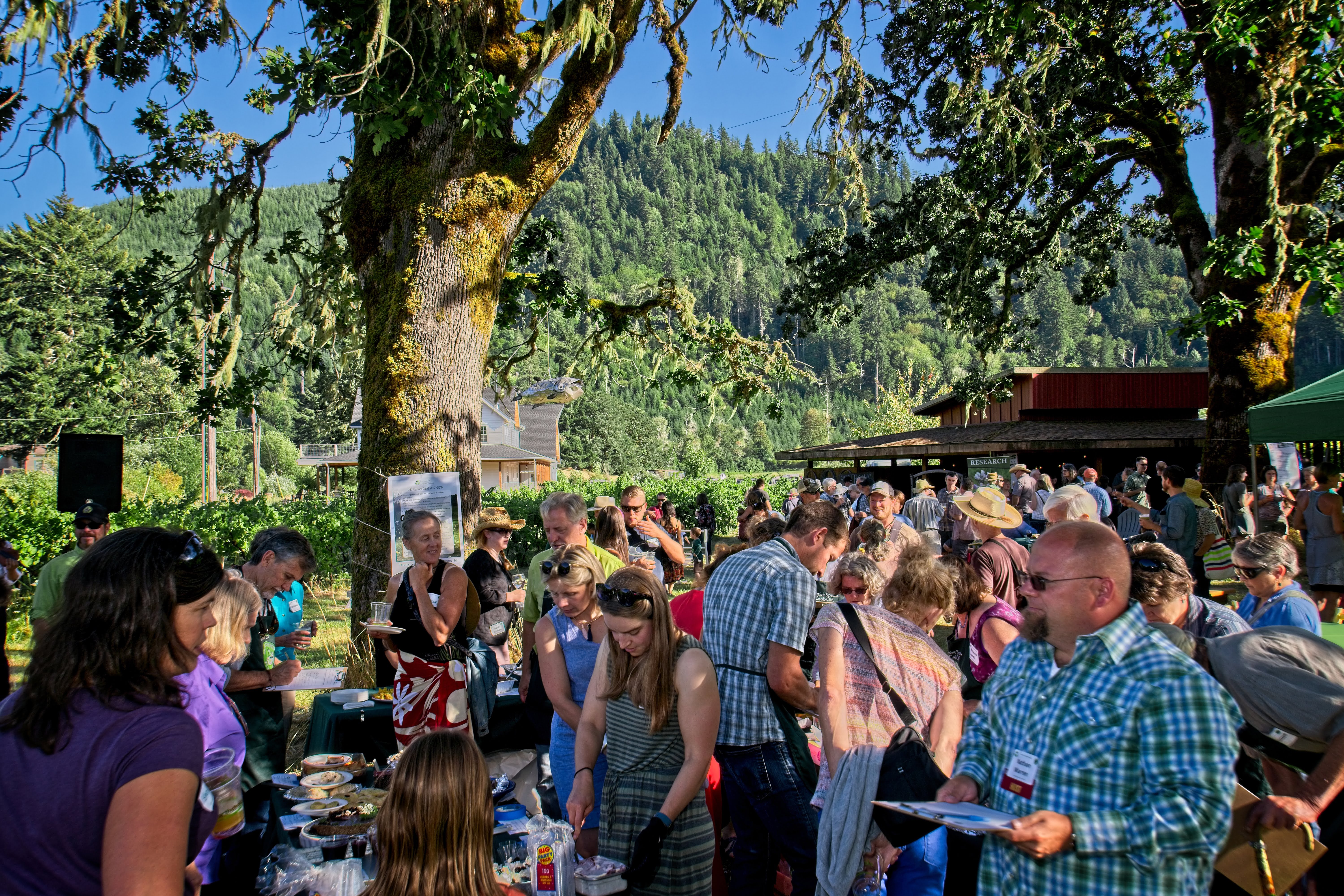
Behind the scenes at the 2018 Invasive Species Cook-off
by Michel Wiman, August 2018
Photography by Owen Dell
On a perfect sunny August afternoon near Wren, Oregon, I walk through tables dressed with apple-green tablecloths and little wreaths of Queen Anne’s lace and burdock. As the band warms up and guests arrive, community supporters bring dish after dish to the Cook-off contest table. This is not your ordinary summer dinner; it’s the Invasive Species Cook-off, where the spotlight is on invasive plants and animals that threaten native wildlife habitats. We’ve gathered at beautiful Harris Bridge Vineyard for this annual celebration of habitat restoration and “eradication by mastication” of invasive species.
The Institute for Applied Ecology (IAE) is in the 7th year of presenting this celebration to raise awareness of the damaging effects of invasive species… by cooking them up and serving them on platters. This year’s event was graciously hosted by Harris Bridge Vineyard at their beautiful site along the Marys River, with a catered buffet featuring delicious invasive plants served by Kalamata Bistro. The Cook-off contest allows community members to come up with creative ways to use invasive species (see winners, below). As judges gather and the band begins, guests begin to mingle at the contest table, commenting about the scrumptious-looking entries. A woman named Cat asks me, "Can I try that?" pointing to a sophisticated presentation of Himalayan blackberries and whipped cream. I wish I could tell her yes, but the panel of honorable judges (including Corvallis Mayor Biff Traber) get the first tastes, then she and the rest of the guests will have their chance to sample.
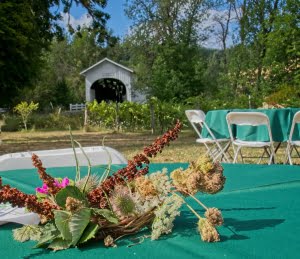

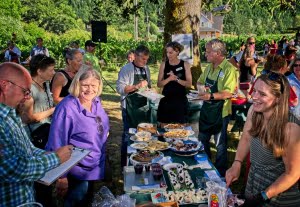
Most everything to eat at the Cook-off features invasive species. The Kalamata Bistro went above and beyond the call of catering duty to include invasive plants, with chicory flowers and dandelion root in the Greek salad, and sheep sorrel in the country beans, and blackberry Melomakarona. Chef Matt Bennett from local restaurant Sybaris in Albany, who catered an earlier cook-off, generously donated plates of sheep sorrel cheese puffs. One contestant harvested and cooked invasive crayfish. Other contest entries included walleye (fish) tacos with blackberry, dandelion and purslane greens, nutria chile verde; stocked bass fish sticks, very spicy garlic-mustard mustard, nettle bread with lemon balm pesto, and fennel blackberry gelato. Beverage contest entries included scotch broom mead, purple varnish clam stout, blackberry and tansy mead, and dandelion wine.
Walking through orderly rows of grapevines that lead down to the Marys River, it’s easy to forget the devastation that invasive plants and animals can inflict. In the US alone, invasive plant and animal control is estimated to cost somewhere between $1 billion and $137 billion every year, not including the loss of diverse pollinator nectar sources, increasing erosion potential from reduced plant diversity, and a suite of other ecosystem services. All of the net proceeds from the Cook-off - tickets, raffle, and bar sales - go directly to IAE’s mission of conserving native species and habitats through restoration, research and education. Presentations by Earthshare Oregon Jan Wilson, Oregon Invasive Species Council Michelle Delepine, and IAE Executive Director Tom Kaye highlighted the need for invasive species awareness and action. All of us at IAE are thankful that our local businesses and community members are eager to support IAE's native habitat work (see event sponsor list, below)! A little help goes a long way to grow, plant, and educate about the importance of native species restoration. Cat, the guest who reveled in the contest samples, captured the hope of the whole event when she exclaimed, “I can’t wait to enter a dish next year!”
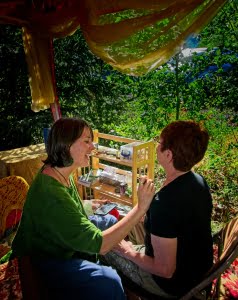
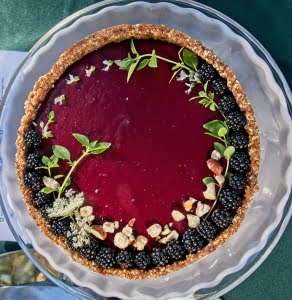
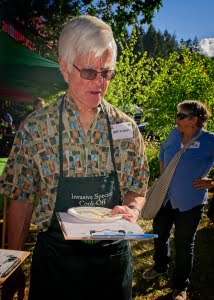
Cook-off Contest Winners: Savory Vegetarian: Elizabeth Silverwolf – Wild Nettle Crescent Buns and Mustard Blossom Butter. Savory Meat: Andrew Esterson – Nutria Chile Verde. Dessert: Laura Cummings, Blackberry-Basil Tart. Beverage: Mousa Diabet, French-style saison with Queen Anne’s lace.
We couldn’t host the Contest without our judges: Mayor Biff Traber, Karl Hartzell, Michelle Delepine, Matthew Paroulek, David Zahler, Rebecca Landis, Alan Thornhill, and Deb Merchant.
Thank you to all of our event sponsors!
Taylor’s checkerspot butterfly sponsor: Earthfort, LLC. Fender’s blue butterfly sponsor: SevenOaks Native Nursery. Oregon silverspot butterfly sponsors: Oregon State Credit Union, Stuewe and Sons, Barker Uerlings Insurance, Heritage Seedlings.
Other Cook-off sponsors and raffle prize donors include Harris Bridge Vineyard, Dell Immagine Photography, Fundamental Vision, Lumos Winery, Sky High Brewing, Mazama Brewing, 2Towns Ciderhouse, Block 15 Brewing, Corvallis Brewing Supply, Havlin Vineyard, MOM Magazine, John and Jody Gaylord, Matt Bennett, Live Well Yoga, del Alma Restaurant, Lone Oak Massage and Bodywork, Coffee Culture, First Alternative Coop, Laughing Planet, Running Princess, Corvallis Cyclery, The Inkwell, Mountain Rose Herbs, Corvallis Knights, Sarah Greene and Chris Kiilsgaard, The Toy Factory, VooDoo Doughnuts, Shonnard’s Nursery, Heart of the Valley Runners, Irene’s Boutique.
Special thanks to our event volunteers: Owen Dell of Dell'Immagine Photography, Tammy Winfield, Mae Curtis, Lila Kaye, Carlos Lopez, and Karl Hartzell.
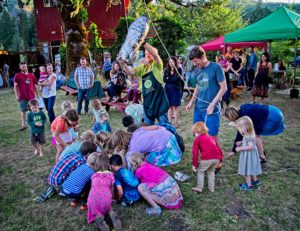
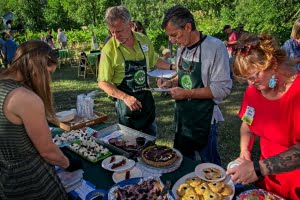
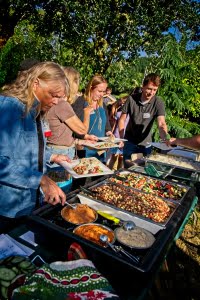
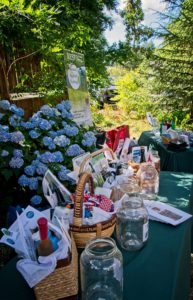

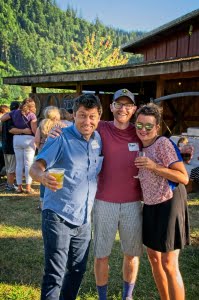
Restoration
Research
Education
Contact
Main Office:
4950 SW Hout Street
Corvallis, OR 97333-9598
541-753-3099
info@appliedeco.org
Southwest Office:
1202 Parkway Dr. Suite B
Santa Fe, NM 87507
(505) 490-4910
swprogram@appliedeco.org
© 2025 Institute for Applied Ecology | Privacy Policy
